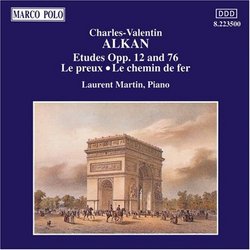| All Artists: Alkan, Laurent Martin Title: Etudes / Le Preux Members Wishing: 1 Total Copies: 0 Label: Marco Polo Release Date: 10/5/1993 Genre: Classical Style: Number of Discs: 1 SwapaCD Credits: 1 UPC: 730099350020 |
Search - Alkan, Laurent Martin :: Etudes / Le Preux
 | Alkan, Laurent Martin Etudes / Le Preux Genre: Classical
|
Larger Image |
CD Details |
CD Reviews(No title). offeck | New York, NY -- United States of America | 12/15/2000 (4 out of 5 stars) "Laurent Martin's performances are commendable, but the recorded sound is very thin and weak. A lot of the content does not serve as the best picture of Alkan, it can be called undistinguished and unmemorable, but there two selections make this disc quite a useful collection. La Chemin De Fer, a musical representation of a railway journey, is an incredibly taxing piece for the pianist and an absolute delight for the audience. Martin swathes and swathes through the merciless demands very admirable. Trois grandes etudes is a momumental piece; the firs tmovement is written for the left hand, the second for the right hand, and the third for both hands united. Although marginally cut, and not as blistering as Smith, or mind-numbingly accurate as Hamelin, Martin's is a very expressive, poised, and strongly projected performance." Rarities for the Alkan Completist Hexameron | 10/25/2006 (5 out of 5 stars) "This Marco Polo release is better suited to the Alkan connoisseur than the novice. Those unfamiliar with Alkan's music should explore the Op. 39 etudes and the Grand Sonata (Alkan: 12 Études, Op. 39 | Alkan: Grande sonate 'Les quatre âges', Sonatine, Le festin d'Esope). Although Lewenthal, Smith, Hamelin and Gibbons have ushered in a revival of Alkan's music, the Marco Polo label with pianist Laurent Martin deserves credit also. Without them many of Alkan's lesser-known pieces would still not be recorded. Therefore, I believe this present release deserves five stars. There may be an inconsistency of quality exhibited from the Op. 12 to the Op. 76 etudes, but any Alkan fan must possess this important contribution to the discography.
Busoni was the first real champion who boldly suggested Alkan belongs in the pantheon of great pianist-composers next to Beethoven, Chopin, Liszt, and Schumann. The "Trois etudes de bravoure" Op. 12 may not be ample support for Busoni's claims, but they are nonetheless intriguing. The first "Prestissimo" is more akin to the rhythmic snap of Gottschalk than Liszt or Chopin. Ronald Smith calls it "a monolithic scherzo abounding in ferocious leaps and widespread octaves, [springing] out from the printed page like a lightning flash." This etude shows off piano-writing that is purely Alkanian; Smith notes "the explosive slap at the extremities of the keyboard, an almost Stravinskian gesture, [which] was to become something of a trademark in his later works." The second "Allegretto" etude is simply mediocre salon music with a few interesting modulations and touches of Alkanian drama. Alkan loved marches and the third "Allegro marziale" etude is a sprightly one. The march theme is one of those banal but infectious tunes capable of reaching popular status. "It is quaint, it is naive, it is gauche..." says Smith. Indeed this etude and all of Op. 12 is second-rate, but it will appeal to Alkan cohorts. "Le preux" (The Valiant Knight) Op. 17 is also innocuous but attractive material for the aficionado of salon music. Lacking embellishments and bombast of the Parsian virtuosi, this etude instead suggests understated virtuosity in the manner of Henselt's etudes. In Smith's estimation it "is a hefty concert study full of peremptory gestures but undistinguished in content." Perhaps, but it is a novelty any Alkan fan would delight in having. Alkan's "Le chemin de fer" (Railway) Op. 27 is better known and has been reissued on the Naxos label. This is a definite gem of Alkan's output with originality and innovative use of figuration in depicting a moving train. Osamu Nakamura recorded this on the Sony label, but I've not heard it. Laurent Martin's technical precision and dynamic control is astounding, though; he delivers this significant piece of program music with maturity and brilliance. Without a doubt, Alkan's "Trois grandes etudes" Op. 76 are a masterpiece. I consider Hamelin's live recording of this triptych the benchmark by which all other executions are measured (Marc-André Hamelin Live at Wigmore Hall). Martin may not have the super-technique and speed of Hamelin, but he has the musicality and stamina to unveil all the nuances of this magnum opus. Smith observes that these three etudes "are designed with consummate authority from their first note to their last, yet they have remained, to this day, a highly specialised and unconquered peak of transcendental pianism." The first for the left hand is a dramatic and lyrical fantasy; pianistic fireworks are absent in favor of serious expression. The right hand "Variations" etude is another epic statement: 16-minutes of Romantic art-music, gorgeous melodic ideas, and stunning virtuosity. In the third etude, both hands are reunited in a whirlwind toccata with daunting technical challenges, including rapid-fire passages in unison, chords spanning a tenth, and sweeps that only the greatest virtuosi can command; Martin is one of them. Bottom line: This release is geared for the Alkan lover or pianophile and probably wouldn't satisfy the casual listener. While this CD shouldn't reach too many homes, it still deserves five stars. The Op. 76 etudes are great compositions and a towering achievement in Alkan's output. Even if the Op. 12 and Op. 17 etudes are trifles, they are rarely recorded pieces from the underrated Alkan and deserve hearings." |

 Track Listings (8) - Disc #1
Track Listings (8) - Disc #1